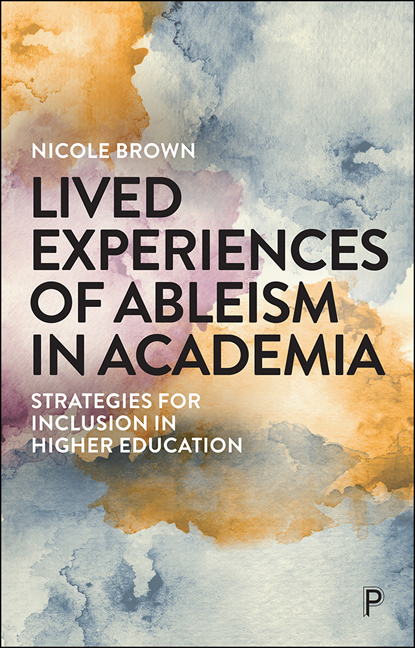10 - Three cheers for Access to Work partnership: two cheers for Two Ticks and one question about a university-wide self-disclosure scheme
Published online by Cambridge University Press: 18 December 2021
Summary
Introduction
It was only in the mid-19th century that the term ‘disabled’ became intransitive. That is to say, it was only then that society, following the practices of the army, excluded people like me with impairments from work. Until then we were understood transitively as ‘disabled from getting bread’ during our transition period from being able-bodied, after which we were expected to pull our weight, however we may. Think of Horatio Nelson, an ‘able seaman’ who continued on active duty with one eye and one arm. He was not alone in the navy. Many ship's surgeons, for example, John Atkins, have written up cases of named officers and able seamen whom they treated with amputations and for gunshot wounds which might have rendered them ‘disabled’ in the modern sense but did not stop them from getting their bread. Atkins describes the amputation made of the right arm of Galfridus Walpole (brother of Sir Robert) while he was in charge of HMS Lion, a 60-gun fourth-rate ship of the line. Captain Walpole continued to serve in the navy after the amputation, his last commission being on HMS Peregrine Galley from 1716 to 1720. Atkins also describes the successful treatment of able seaman Alexander Henderson, who lost an eye ‘struck out by a splinter’.
After the Equality Act 2010 enshrined in UK law four EU Equal Treatment Directives on pay, sex, race and disability discrimination, I for one, hoped that we would return to the days of transitivity. My transition period had been a long one of denial that I could not concentrate when looking, so I skim read with my hand over my left eye, and only gave up driving after four serious accidents, after which I continued to cycle until I ran into a six-inch kerb that I just didn't see. I had sold my car, and now had to sell my bicycles, but what was I to do about my work? It was 2008, and when I had a meeting with the dean and administrators in my department, it became clear that they were not able to help. This was not because they were unwilling, but more that they expected me to give up work, now that I was disabled.
- Type
- Chapter
- Information
- Lived Experiences of Ableism in AcademiaStrategies for Inclusion in Higher Education, pp. 171 - 184Publisher: Bristol University PressPrint publication year: 2021



